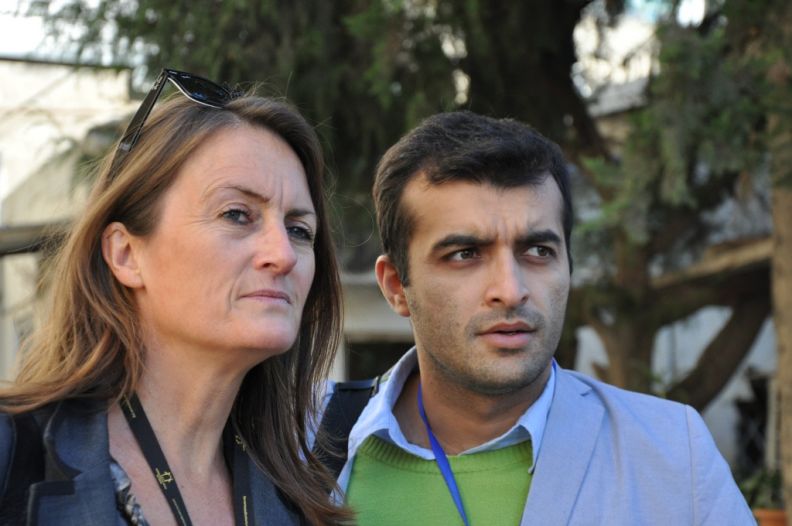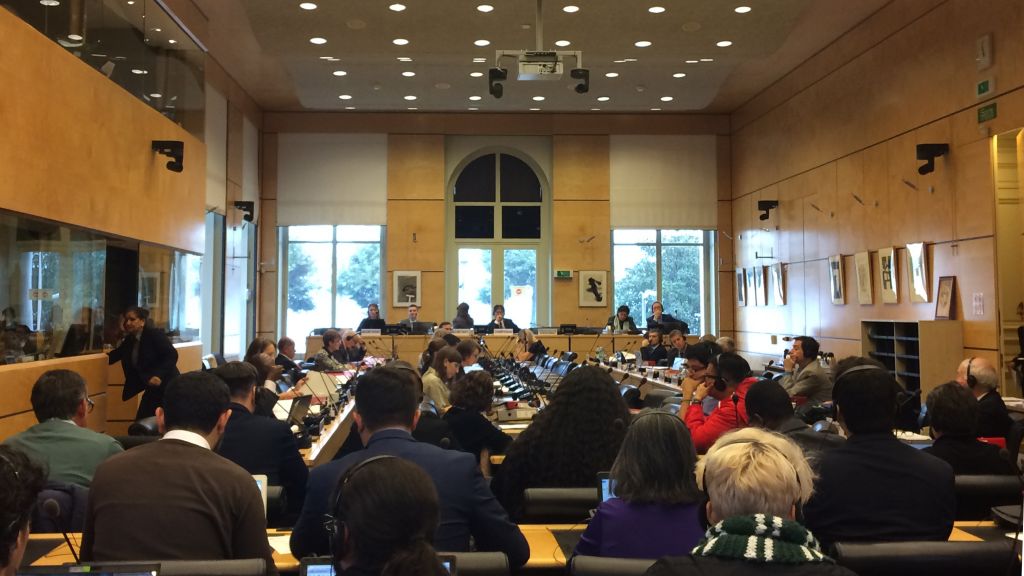The Human Rights Committee last reviewed Azerbaijan in 2009 where it expressed concerns around issues such as discrimination against women and domestic violence, the right to a fair trial by an independent and impartial tribunal and arbitrary detention, freedom of opinion and expression, and freedom of association and assembly.
“The review in 2016 showed how much the situation deteriorated since 2009 – and that authorities did not follow the 2009 recommendations. The Committee’s conclusions are yet another confirmation of what other international institutions and bodies have highlighted: a worsening situation for human rights defenders, civil society, and individual freedoms in Azerbaijan,” commented Florian Irminger, Head of Advocacy at the Human Rights House Foundation (HRHF), who participated in the reviews in 2009 and 2016 in Geneva, alongside Azerbaijan civil society.
The review of Azerbaijan before the Human Rights Committee, composed of 17 independent experts, took place in Geneva, on 20 and 21 October 2016, with a 13 member delegation representing the government. The Committee’s conclusions and recommendations were published on 4 November 2016.
Committee calls to end crackdown on civil society
Concerns about the situation of journalists and media institutions were highlighted during questions to the Azerbaijani delegation from the Committee member Rodrigues Rescia, who mentioned the cases of Emin Huseynov, Khadija Ismayil, and Rasim Aliyev. He then added that the situation of leaders of national and international non-governmental organisations (NGOs) has in no way improved, and regretted that Azerbaijan did not answer the questions of the Committee in this regard, referring to “a high number of criminal investigations against NGOs, the freezing of their assets and those of their members, as well as the significant number of NGOs that have been closed.”
The Committee in its conclusions called upon Azerbaijan to revise laws, regulations and practices imposing “stringent registration requirements for public associations/NGOs, broad grounds for denial of registration and temporary suspension or permanent closure of NGOs, restrictive regulations on grants and donations received by public associations/NGO, including the ban on foreign funding, and heavy penalties for violations of relevant legislation.” The Committee further called upon Azerbaijan to ensuring “legal provisions regulating NGO grants allow access to foreign funding and do not put at risk the effective operation of public associations due to overly limited or overly-regulated fundraising options.”
The Committee highlighted the use of travel bans by the Azerbaijani authorities against journalists, opposition politicians, human rights defenders and lawyers in retaliation for their professional activities. The Committee recommended that Azerbaijan should lift all existing bans that violate the Covenant, as well as “refrain from imposing travel bans against journalists, opposition politicians, human rights defenders and lawyers arbitrarily and guarantee full respect for their freedom to leave the country.”
In an strong condemnation of violations to freedom of association, the Committee called upon Azerbaijan to end “the crackdown on public associations and ensuring that they can operate freely and without fear of retribution for their legitimate activities.”
Repression during electoral cycles
The Committee expressed its concern about the referendum held on 26 September, stating that the authorities should ensure that the amendments to its Constitution should be compatible with Azerbaijan’s obligations, echoing concerns of Azerbaijani civil society that the constitution can serve to further restrict human rights enjoyment in the country.
The Committee member Photini Pazartzis stated that irregularities during the election processes in Azerbaijan “appear to have been, in the eyes of the State party, normal,” and further asked questions about the constitution referendum of 26 September itself.
The government delegation dismissed the Venice Commission opinion on the amendments to the constitution, doubting that an “international organization comprising about 45 lawyers” could adopt an opinion on a referendum act consisting of 29 articles in only 10 days. The government similarly dismissed the Venice Commission on other issues, during the review.
NGOs have on their side expressed their concerns about the electoral process also directly to the Committee members in Geneva. Intimidation and arrests of those raising their voice to criticise the process were reported regularly during the weeks that preceded the referendum. Journalists, bloggers, human rights defenders and political opponents were targeted by the authorities in an attempt to stop the spreading of information about the referendum and their participation in protest rallies. The authorities tried to prevent protest actions from taking place and on some occasions attacked and detained demonstrators and journalists.
Azerbaijan continues to reject allegations of torture
The Committee also urged Azerbaijan to ensure that all allegations of torture and ill-treatment are thoroughly investigated by an independent and impartial body, echoing the earlier findings of the Committee against Torture (CAT). It also recommended that Azerbaijan should conduct necessary reforms to ensure regular monitoring and inspection of all places of detention by an independent and effective mechanism and consider NGOs in the process.
The use of torture against human rights defenders such as Emin Huseynov and Leyla Yunus, was raised by Committee member Olivier de Frouville, who highlighted that their cases were brought to the European Court of Human Rights, and asked the government about its presentation to the CAT, in which it reported that it had no single case of torture in recent years. The government dismissed issues related to torture, arguing that there were findings of violations of procedural aspects but not in substance, meaning there were no cases of torture or ill treatment.
“In its answers to Olivier de Frouville, the government actually underlined that there was no case, not a single one, in which Azerbaijan can be taken for failing to cooperate with the Court, meaning to execute judgments, which is simply a lie, given the number of times Azerbaijan is brought up in the execution process of the Committee of Ministers of the Council of Europe,” commented Florian Irminger.
Harassment of lawyers and reprisals for cooperating with the Committee
Recommendations were also made by the Committee to address reports of physical attacks, politically motivated criminal charges, and other reprisals, such as disbarment against lawyers critical of the authorities, and who represent victims of torture, as well human rights defenders, activists and journalists, as HRHF has reported on in “Human Rights Lawyers at Risk”. Azerbaijan was also urged to “redouble its efforts to address effectively the shortage of lawyers in the country.” The Committee further requested from Azerbaijan to report, within one year, on the measures taken to guarantee the independence and safety of lawyers.
Committee member Yuval Shany focused his questions on the access to a lawyer for persons deprived of their liberty and on politically motivated trials and allegations of targeting human rights defenders and lawyers. In reference to the cases brought up by Yuval Shany, including that of lawyer Intigam Aliyev, the Azerbaijani government replied “no lawyer in Azerbaijan has been struck off or disbarred for defending a particular person who is an opposition figure or engaged in political activity.” In his final remarks at the end of the review of Azerbaijan, Yuval Shany highlighted the case of disbarred lawyer Khalid Bagirov: “He was punished for doing his job.”
The session ended with a warning: The Committee chairman urged Azerbaijan to ensure that nobody who provided information to the Committee be victim of any reprisal. Khalaf Khalafov, Deputy Minister of Foreign Affairs of Azerbaijan, said “fear of non-governmental organisations about persecution and reprisals were absurd as everyone in Azerbaijan could express their criticism through the media.”
“Given the comments made by the delegation against Emin Huseynov, the fear of reprisals is once again a sad reality. Azerbaijan indeed has a track-record of punishing those who cooperated with Council of Europe mechanisms and we believe similar intimidation and reprisal tactics can again be used,” concluded Florian Irminger.
 HRHF director Maria Dahle and Rasul Jafarov in Baku.
HRHF director Maria Dahle and Rasul Jafarov in Baku.
HRHF invited Rasul Jafarov for his first trip abroad to advocate in favour of human rights in Azerbaijan. He participated in Geneva at the Human Rights Committee session, which reviewed Azerbaijan in July 2009. He later also participated at the review of Azerbaijan at the 43rd session of the United Nations Committee against Torture in Geneva in November 2009.
In the video above, Florian Irminger highlights the case of Rasul Jafarov during a statment at the opening of the Committee in September 2016.
Rasul Jafarov, sentenced to 6 and a half years imprisonment in April 2015 and released in June 2016, has since continuously worked to favour the implementation by the state of its obligations under international human rights law. “We remember how inspired Rasul Jafarov was by the interest shown by the members of the committees to the situation in Azerbaijan. He truly believed a difference could be made and was encouraged by those members to continue his work” recalled Maria Dahle.
Documents:
- HRHF submission to the Human Rights Committee (2016)
- Concluding observations of the Human Rights Committee on Azerbaijan (2016)
- Azerbaijan human rights under review
- Amid Azerbaijan’s suppression of public debate, no vote is free and fair
- Azerbaijan: “Rethink punitive approach to civil society”
- HRHF Statement at Human Rights Council September 2016
- November 2015 CAT review of Azerbaijan
- “Breaking point in Azerbaijan”
- Previous review in 2009: UN Human Rights Committee begins its review of Azerbaijan
More on the story





